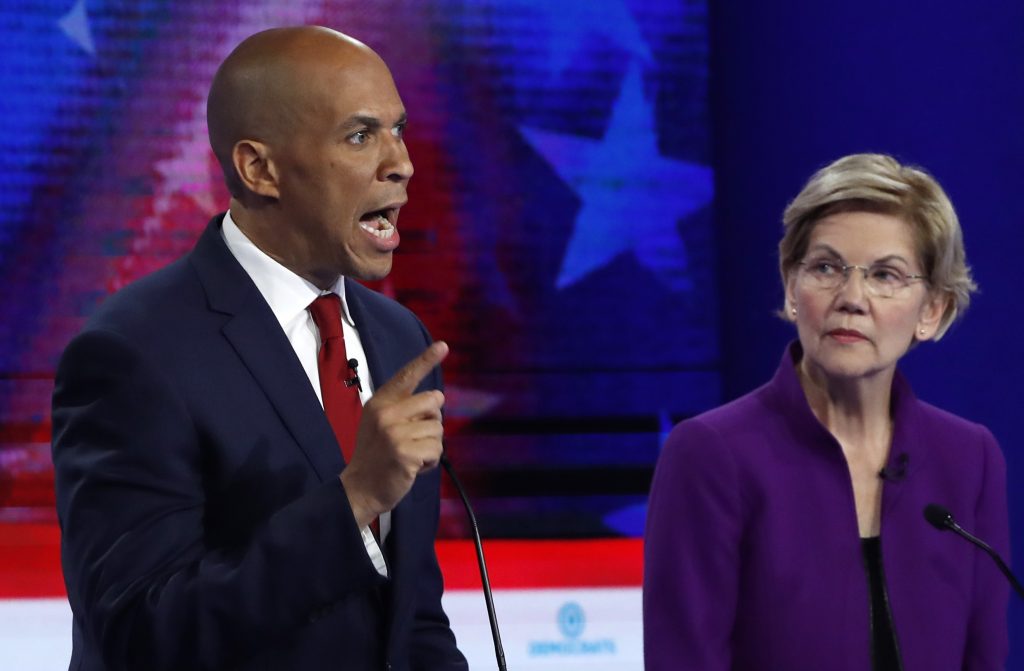
In last night’s Democratic presidential debate Senator Cory Booker (D-NJ) went after Senator Elizabeth Warren’s (D-MA) wealth tax proposal. He contended, “But the tax the way we’re putting it forward right now, the wealth tax, I’m sorry, it’s cumbersome. It’s been tried by other nations. It’s hard to evaluate. We can get the same amount of revenue through just taxation.” Instead, Booker prefers other methods to tax the wealthy. One of his proposals, mark-to-market taxation of capital gains, isn’t all that different than a wealth tax in some respects.
Cory Booker proposes to increase taxes on the wealthy by increasing the tax rate on capital gains to be equal to ordinary income (from 20 percent to 39.6 percent) and move to what’s called a “mark-to-market,” or an accrual based regime. Under this system, capital gains (the profit earned by selling an asset) would no longer be taxed at the time of sale. Rather, capital gains would be taxed every single year as it changes value. This change would raise taxes on the wealthy by eliminating deferral and taxing some capital gains that completely escape taxation due to the ability to step up basis at death.
A wealth tax, in contrast, is an annual tax on the net worth of a taxpayer. A few Democratic presidential candidates have proposed this, Elizabeth Warren being the most prominent. Under her proposal, high net worth individuals would be subject to a 2 percent per year tax on assets over $50 million and a 6 percent annual tax on assets over $1 billion.

Under certain assumptions, a wealth tax and a mark-to-market income tax have similar effects on wealth. In practice, a wealth tax taxes the net worth of an individual each year rather than income. However, the act of taxing the principle each year implicitly reduces the return on saving and can be equated to an income tax. For example, a wealth tax of 2 percent per year on an asset
that returns 5 percent each year is about equal to a mark-to-market income tax
of 40 percent.[1]
And while Booker did critique Warren’s wealth tax for being
cumbersome, a mark-to-market income tax may suffer from similar challenges. A
big challenge with a wealth tax is valuing assets that do not have readily
known market prices. Closely held businesses, for example, are hard to value
because they are not traded in the open market like corporate stock. A
mark-to-market tax also requires valuing assets each year in order to measure
their change in net worth. However, valuation problems are likely easier
to address with a mark-to-market system as the tax could be applied
retrospectively on hard-to-value assets.
Ultimately, a mark-to-market tax regime for capital assets
is probably more feasible. One of the most significant roadblocks to a wealth
tax, besides political feasibility, is the question
of whether it is constitutional. Mark-to-market also taxes “lucky”
investors more than a wealth tax, which lightly taxes prospective rents.
This isn’t to say that a mark-to-market system is without its downsides. It
would increase the effective tax burden on saving, which could reduce national
saving and national income. And Booker’s proposal to limit mark-to-market
treatment to a certain group of taxpayers introduces administrative challenges
of its own.
The Democratic nominees will continue to critique each other’s tax plans, but ultimately many of the ideas are similar ways to get to the same place.
[1] To
translate a wealth tax into an equivalent income tax rate, one divides the
annual wealth tax rate by the rate of return. In this case, (2% wealth tax) /
(5% rate of return) = 40% income tax rate.
The post Cory Booker goes after Elizabeth Warren’s wealth tax appeared first on American Enterprise Institute – AEI.
